was brilliantly sunny, and both the promenade and
the Row were crowded. Slightly hidden behind a
tree, he stood and watched. A gay crowd of promenaders
passed along the broad path, and the air was filled
with the echo of laughter, the jargon of the day,
intimate references to a common world, invitations
lightly given and lightly accepted. It was Sunday
morning, in a season when colour was the craze of
the moment, and the women who swept by seemed to his
rather mystical fancy like the flowers in some of the
great open spaces he knew so well, stirred into movement
by a soft wind. They were very beautiful, these
western women; handsome, too, the men with whom they
talked and flirted. Always they had that air,
however, of absolute complacency, as though they felt
nothing of the quest which lay like a thread of torture
amongst the nerves of Prince Shan’s being.
There was no more distinguished figure among the men
there than he himself, and yet the sense of alienation
grew in his heart as he watched. There were many
familiar faces, many to whom he could have spoken,
no one who would not have greeted him with interest,
even with gratification. And yet he had never
been so deeply conscious of the gulf which lay between
the oriental fatalism of his life and ways and the
placid self-assurance of these westerners, so well-content
with the earth upon which their feet fell. He
had judged with perfect accuracy the place which he
held in their thoughts and estimation. He was
something of a curiosity, his title half a joke, the
splendour of his long race a thing unrealisable by
these scions of a more recent aristocracy. Yet
supposing that this new wonder had not come into his
life, that Immelan had been a shade more eloquent,
had pleaded his cause upon a higher level, that Naida
Karetsky also had formed a different impression of
the world which he was studying so earnestly,—what
a transformation he could have brought upon this light-hearted
and joyous scene! The scales had so nearly balanced;
at the bottom of his heart he was conscious of a certain
faint contempt for the almost bovine self-satisfaction
of a nation without eyes. Literature and painting,
art in all its far-flung branches, even science, were
suffering in these days from a general and paralysing
inertia. Life which demanded no sacrifice of anybody
was destructive of everything in the nature of aspiration.
Sport seemed to be the only incentive to sobriety,
the desire to live long in this fat land the only
brake upon an era of self-indulgence. He looked
eastwards to where his own millions were toiling,
with his day-by-day maxims in their ears, and it seemed
to his elastic fancy that he was inhaling a long breath
of cooler and more vigorous life.




